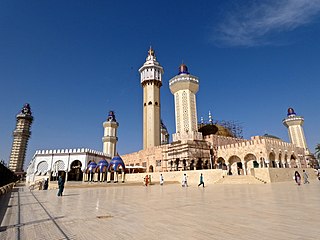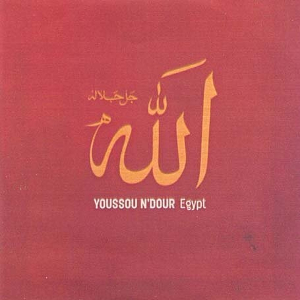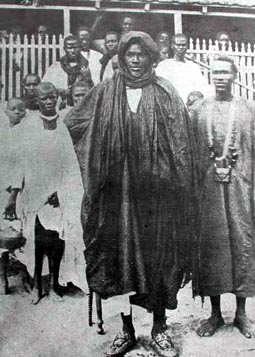This is a list of Sufi orders (Tariqas) in Senegal and the Gambia. They are active Muslim organizations that can also be found in many other parts of Africa and the Islamic world. Their members are mainly Wolofs, Fulas and Tocouleurs.
This is a list of Sufi orders (Tariqas) in Senegal and the Gambia. They are active Muslim organizations that can also be found in many other parts of Africa and the Islamic world. Their members are mainly Wolofs, Fulas and Tocouleurs.
The four largest Muslim brotherhoods in Senegal are:

The Mouride brotherhood is a large tariqa most prominent in Senegal and The Gambia with headquarters in the city of Touba, which is a holy city for the order. Adherents are called Mourides, from the Arabic word murīd, a term used generally in Sufism to designate a disciple of a spiritual guide. The beliefs and practices of the Mourides constitute Mouridism. Mouride disciples call themselves taalibé in Wolof and must undergo a ritual of allegiance called njebbel, as it is considered highly important to have a sheikh "spiritual guide" in order to become a Mouride. The Mouride brotherhood was founded in 1883 in Senegal by Amadou Bamba. The Mouride make up around 40 percent of the total population, and their influence over everyday life can be seen throughout Senegal.

The Layene is a religious brotherhood of Sufi Muslims based in Senegal and founded in 1884 by Seydina Limamou Laye (1844-1909), who was born Limamou Thiaw. It is notable for its belief that their founder was the Mahdi, and that his son, Seydina Issa Rouhou Laye, was the reincarnation of Jesus.
In the Muslim world, the marabout is a descendant of Muhammad and a Muslim religious leader and teacher who historically had the function of a chaplain serving as a part of an Islamic army, notably in North Africa and the Sahara region, in West Africa, and historically in the Maghreb.

The Tijjani order is a Sufi order of Sunni Islam named after Ahmad al-Tijani. It originated in the Algeria but now more widespread in Maghreb, West Africa, particularly in Senegal, Gambia, Mauritania, Mali, Guinea, Niger, Chad, Ghana, Northern and Southwestern Nigeria and some parts of Sudan. The Tijāniyyah order is also present in the states of Kerala, Tamil Nadu and Karnataka in India. Its adherents are called Tijānī. Tijānīs place great importance on culture and education and emphasize the individual adhesion of the disciple (murid). To become a member of the order, one must receive the Tijānī wird, or a sequence of holy phrases to be repeated twice daily, from a muqaddam, or representative of the order.

A zawiya or zaouia is a building and institution associated with Sufis in the Islamic world. It can serve a variety of functions such a place of worship, school, monastery and/or mausoleum. In some regions the term is interchangeable with the term khanqah, which serves a similar purpose. In the Maghreb, the term is often used for a place where the founder of a Sufi order or a local saint or holy man lived and was buried. In the Maghreb the word can also be used to refer to the wider tariqa and its membership.

Ahmadu Bamba Mbacke also known to followers as the Servant of the Messenger and Serigne Touba or "Sheikh of Touba", was a Sufi saint and religious leader in Senegal and the founder of the large Mouride Brotherhood.

Tambacounda is the largest city in eastern Senegal, 400 kilometres (250 mi) southeast of Dakar, and is the regional capital of the province of the same name. Its population in 2023 was 149,071.

Touba is a city in central Senegal, part of Diourbel Region and Mbacké district. With a population of 1,120,824 in 2023, it is the second most populated Senegalese city after Dakar. It is the holy city of Mouridism and the burial place of its founder, Shaikh Ahmadou Bàmba Mbàcke. Next to his tomb stands a large mosque, completed in 1963.

Serigne Saliou Mbacké was a saint (Wali) and Grand Marabout (leader) of the Mouride movement in Senegal from 1990 until his death in 2007.
Mbacké is a city and urban commune in central Senegal, located 190 km (118 mi) east of Dakar. It is the capital of an administrative department in the Diourbel region. Along with the nearby city of Touba, Mbacké forms an urban conurbation whose population currently stands at 1,222,275, making it Senegal's second largest agglomeration. It is connected to Dakar and Touba by the N3 road.

Islam is the predominant religion in Senegal. 97 percent of the country's population is estimated to be Muslim. Islam has had a presence in Senegal since the 11th century. Sufi brotherhoods expanded with French colonization, as people turned to religious authority rather than the colonial administration. The main Sufi orders are the Tijaniyyah, the Muridiyyah or Mourides, and to a lesser extent, the pan-Islamic Qadiriyyah and the smaller Layene order. Approximately 1% are Shiites.

Egypt is a Grammy Award-winning album by the Senegalese musician Youssou N'Dour, on which he is accompanied by the Egyptian Fathy Salama Orchestra. By incorporating Arabic influences and focusing on Muslim religious themes, the album was a departure from previous N'Dour releases. In the original Senegalese release, it was named Sant Allah.

Sheikh Ibrahima Fall (1855–1930) was a disciple of Sheikh Aamadu Bàmba Mbàkke, founder of the Mouride Brotherhood movement in West Africa. Well known in the Mouride Brotherhood, Ibrahima Fall established the influential Baye Fall movement.
El Hadji Serigne Mouhamadou Lamine Bara Mbacké, or Sheikh Bara Mbacké was the Grand Marabout of the Mouride movement in Senegal from 2007 until his death in 2010. The movement is prominent outside Senegal as well, in places such as New York, Paris and Rome.
Religion and beliefs occupy an important place in the daily life of the nation of Senegal. The majority of citizens follow Islam. In 2013, 6% of the population followed indigenous beliefs, while 2% followed Christianity.

The Great Mosque of Touba is a mosque in Touba, Senegal. It was founded by Ahmad Bamba in 1887 and completed in 1963. Bamba died in 1927 and was interred inside the mosque. Since his death the mosque has been controlled by his family. It is the largest building in the city and one of the largest mosques in Africa, with a capacity of 7,000. It is the site of a pilgrimage, the Grand Magal of Touba.
Mame Diarra Bousso (1833–1866) is a Sufi saint from Senegal. The annual pilgrimage to the site of her death and mausoleum is the only pilgrimage dedicated to a woman in Senegal. She was the mother of Amadou Bamba.
The Grand Magal of Touba is the annual religious pilgrimage of the Senegalese Mouride Brotherhood, one of the four Islamic Sufi orders of Senegal. On the 18th of Safar, the second month of the Islamic calendar, pilgrims gather in the holy Mouride city of Touba to celebrate the life and teachings of Amadou Bamba, the founder of the brotherhood.
Serigne Mouhamadou Moustapha Mbacké was a Senegalese religious leader. He served as the first Caliph of the Mouride brotherhood, a large Sufi order based in Senegal, from 1927 until his death on July 13, 1945. He was the first son of Sufi saint and religious leader Sheikh Amadou Bamba.
Serigne Abdou Ahad Mbacké was a Senegalese religious leader. He served as the third Caliph of the Mouride brotherhood, a large Sufi order based in Senegal, from 1968 until his death in 1989. He was the son of Sufi saint and religious leader Sheikh Amadou Bamba.